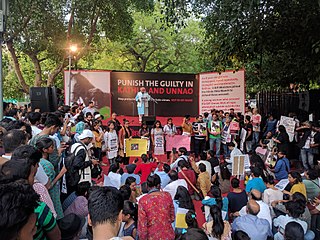Life imprisonment is any sentence of imprisonment for a crime under which convicted criminals are to remain in prison for the rest of their lives or indefinitely until pardoned, paroled, or commuted to a fixed term. Crimes that warrant life imprisonment are usually violent and/or dangerous. Examples of crimes that result in life sentences are murder, torture, terrorism, child abuse resulting in death, rape, espionage, treason, drug trafficking, drug possession, human trafficking, severe fraud and financial crimes, aggravated criminal damage, arson, kidnapping, burglary, and robbery, piracy, aircraft hijacking, and genocide, crimes against humanity, war crimes, severe cases of child pornography, or any three felonies in the case of a three-strikes law.

The Hudud Ordinances are laws in Pakistan enacted in 1979 as part of the Islamization of Pakistan by Muhammad Zia-ul-Haq, the sixth president of Pakistan. It replaced parts of the British-era Pakistan Penal Code, adding new criminal offences of adultery and fornication, and new punishments of whipping, amputation, and stoning to death. After much controversy and criticism parts of the law were extensively revised in 2006 by the Women's Protection Bill.

Capital punishment in India is a legal penalty for some crimes under the country's main substantive penal legislation, the Indian Penal Code, as well as other laws. Executions are carried out by hanging as the primary method of execution as given under Section 354(5) of the Criminal Code of Procedure, 1973 is "Hanging by the neck until dead", and is awarded only in the 'rarest of cases'.

The Indian Penal Code (IPC) is the official criminal code of India. It is a comprehensive code intended to cover all substantive aspects of criminal law. The code was drafted on the recommendations of the first Law Commission of India established in 1834 under the Charter Act of 1833 under the chairmanship of Thomas Babington Macaulay. It came into force in India during the British rule in 1862. However, it did not apply automatically in the Princely states, which had their own courts and legal systems until the 1940s. The code has since been amended several times and is now supplemented by other criminal provisions.
The legal age of consent for sexual activity varies by jurisdiction across Asia. The specific activity engaged in or the gender of participants can also be relevant factors. Below is a discussion of the various laws dealing with this subject. The highlighted age refers to an age at or above which an individual can engage in unfettered sexual relations with another who is also at or above that age. Other variables, such as homosexual relations or close in age exceptions, may exist, and are noted when relevant.
Rape is a type of sexual assault initiated by one or more persons against another person without that person's consent. The act may be carried out by physical force, under threat or manipulation, by impersonation, or with a person who is incapable of giving valid consent.
The 1992Ajmer rape case involved the serial gangrape and blackmailing of more than five hundred school and college-aged girls in Ajmer, Rajasthan. The perpetrators were a group of young Muslim men led by Farooq and Nafis Chishty, members of the Khadim family that oversaw the caretaking of the Ajmer Sharif Dargah. Over the course of multiple years, ending in 1992, victims were lured into a remote farmhouse or bungalow, where they were sexually assaulted by one or several of the men. Additionally, the perpetrators took nude or otherwise revealing photographs of their victims, which were used as blackmail to prevent the women from speaking out.
The Suryanelli rape case refers to a case of kidnapping and subsequent rape of a 16-year-old school girl from Suryanelli, Kerala, India, in 1996. The girl was allegedly lured with the promise of marriage on 16 January 1996 and kidnapped. She was allegedly raped by 37 of the 42 accused persons, over a period of 40 days. The remaining had abetted the crime. After P.J. Kurien, the then Union Minister and later Rajya Sabha Deputy Chairman belonging to UDF led by Congress party, was named, the issue was politicised, due to a then upcoming general election. Several women's rights activists like K. Ajitha and Suja Susan George, and women's organisations, like NFIW and Anweshi, have taken an interest in the case.
The Mathura rape case was an incident of custodial rape in India on 26 March 1972, wherein Mathura, a young tribal girl, was allegedly raped by two policemen on the compound of Desaiganj Police Station in Gadchiroli district of Maharashtra. After the Supreme Court acquitted the accused, there was public outcry and protests, which eventually led to amendments in the Indian rape law via The Criminal Law Amendment Act 1983.
In India according to Section 300 of the Indian Penal Code, 1860, murder is defined as follows:
Murder.--Except in the cases hereinafter excepted, culpable homicide is murder, if the act by which the death is caused is done with the intention of causing death, or- 167 2ndly.-If it is done with the intention of causing such bodily injury as the offender knows to be likely to cause the death of the person to whom the harm is caused. or- 3rdly.-If it is done with the intention of causing bodily injury to any person and the bodily injury intended to be inflicted is sufficient in the ordinary course of nature to cause death, or- 4thly.-If the person committing the act knows that it is so imminently dangerous that it must, in all probability, cause death, or such bodily injury as is likely to cause death, and commits such act without any excuse for incurring the risk of causing death or such injury as aforesaid.

The Code of Criminal Procedure commonly called Criminal Procedure Code (CrPC) is the main legislation on procedure for administration of substantive criminal law in India. It was enacted in 1973 and came into force on 1 April 1974. It provides the machinery for the investigation of crime, apprehension of suspected criminals, collection of evidence, determination of guilt or innocence of the accused person and the determination of punishment of the guilty. It also deals with public nuisance, prevention of offences and maintenance of wife, child and parents.
Rape is the fourth most common crime against women in India. According to the 2021 annual report of the National Crime Records Bureau (NCRB), 31,677 rape cases were registered across the country, or an average of 86 cases daily, a rise from 2020 with 28,046 cases, while in 2019, 32,033 cases were registered. Of the total 31,677 rape cases, 28,147(nearly 89%) of the rapes were committed by persons known to the victim. The share of victims who were minors or below 18 – the legal age of consent – stood at 10%.

The Criminal Law (Amendment) Act, 2013 is an Indian legislation passed by the Lok Sabha on 19 March 2013, and by the Rajya Sabha on 21 March 2013, which provides for amendment of Indian Penal Code, Indian Evidence Act, and Code of Criminal Procedure, 1973 on laws related to sexual offences. The Bill received Presidential assent on 2 April 2013 and was deemed to be effective from 3 February 2013. It was originally an Ordinance promulgated by the President of India, Pranab Mukherjee, on 3 February 2013, in light of the protests in the 2012 Delhi gang rape case.

The 2013 Mumbai gang rape, also known as the Shakti Mills gang rape, refers to the incident in which a 22-year-old photojournalist, who was interning with an English-language magazine in Mumbai, was gang-raped by five people including a juvenile. The incident occurred on 22 August 2013, when she had gone to the deserted Shakti Mills compound, near Mahalaxmi in South Mumbai, with a male colleague on an assignment. The accused had tied up the victim's colleague with belts and raped her. The accused took photos of the victim during the sexual assault, and threatened to release them to social networks if she reported the rape. Later, an eighteen-year-old call centre employee reported that she too had been gang-raped, on 31 July 2013 inside the mills complex.
Section 309 of the Indian Penal Code criminalises attempted suicide as well as suicide assistance.
2014 Birbhum gang rape case involves a gang rape which took place on 21 January 2014 in Birbhum district of West Bengal. When a 20-year-old girl from Subolpur village was gang-raped by a group of people, as a punishment ordered by Salishi Sabha, a village kangaroo court, for having affair with a boy of a different community.
The legal system of the United Arab Emirates is a blend of Islamic Sharia law and French civil law. Some free-trade zones in Dubai have their own independent legal systems and courts and Dubai is considering introducing English common law there.

Suhas Katti v. Tamil Nadu was the first case in India where a conviction was handed down in connection with the posting of obscene messages on the internet under the controversial section 67 of the Information Technology Act, 2000. The case was filed in February 2004 and In a short span of about seven months from the filing of the FIR, the Chennai Cyber Crime Cell achieved the conviction . In the case, a woman complained to the police about a man who was sending her obscene, defamatory and annoying messages in a Yahoo message group. The accused also forwarded emails received in a fake account opened by him in the victim's name. The victim also received phone calls by people who believed she was soliciting for sex work.

The Kathua rape case involved the abduction, gang rape, and murder of an 8-year-old Muslim girl, Asifa Bano, by six Hindu men and a juvenile, in January 2018 in the Rasana village near Kathua in Jammu and Kashmir, India. A chargesheet for the case was filed, the accused were arrested and the trial began in Kathua on 16 April 2018. The victim belonged to the nomadic Bakarwal community. She disappeared for a week before her body was discovered by the villagers a kilometer away from the village. The incident made national news when charges were filed against eight men in April 2018. The arrests of the accused led to protests by the Panthers Party and other local groups, who sought justice for the victim. A protest in support of the accused men was attended by two ministers from the Bharatiya Janata Party, both of whom later resigned. The gang rape and murder, as well as the support the accused received, sparked widespread outrage in India and world-wide.
The Section 228A of the Indian Penal Code was inserted into the Indian Penal Code 1860 by the Criminal Law amendment Act 1983 by the Parliament of India to prevent social victimization or ostracism of the victim of a sexual offence. The law provides for up to two years imprisonment with or without fine for those who reveal the identity of victims of sexual abuse in public. The law has been amended subsequently to add more sections of the Indian Penal Code under its purview.






